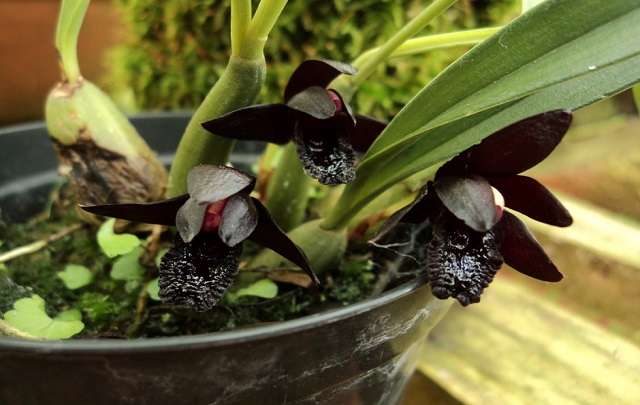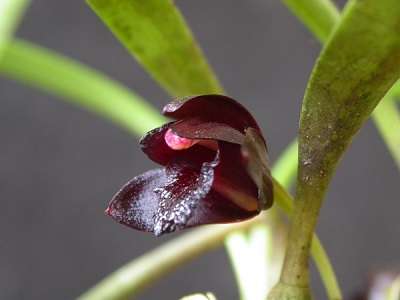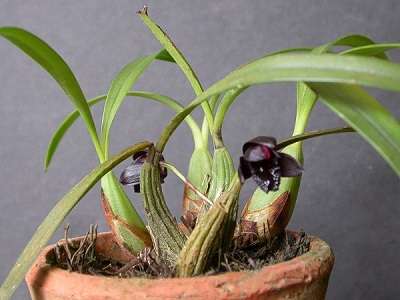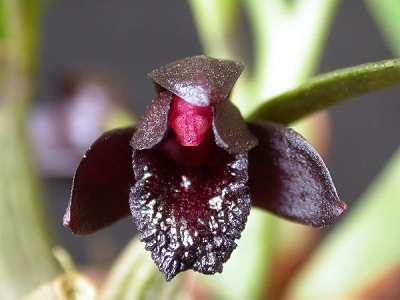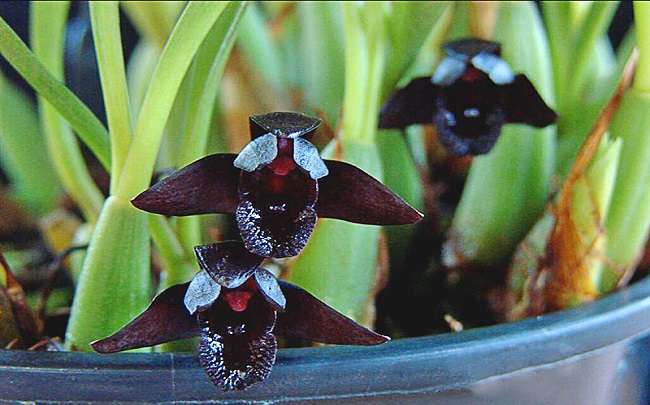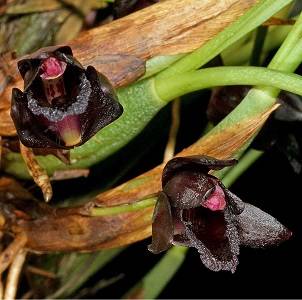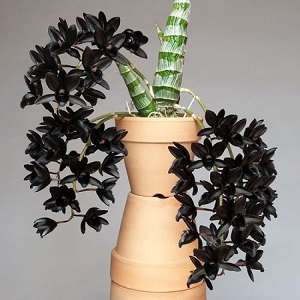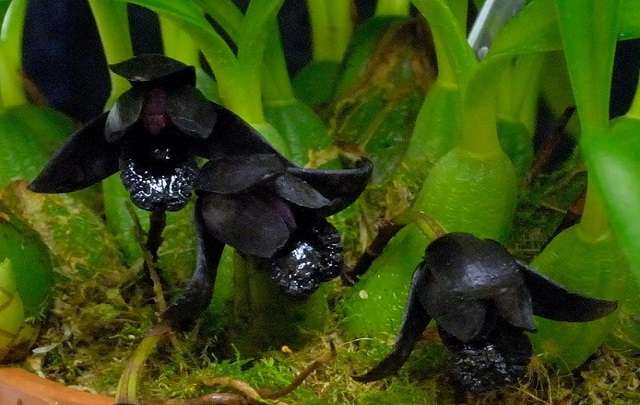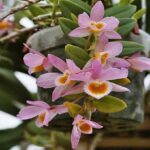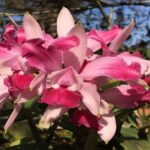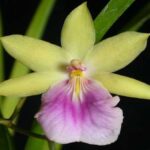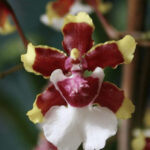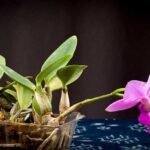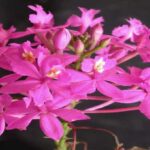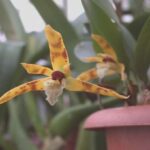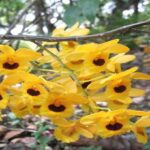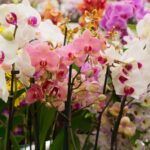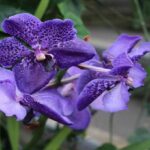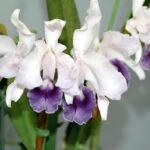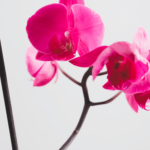Orchids are well-known for their beauty and the wide variety of their flowers.
Among the more than 35,000 existing species, some stand out for their beauty, featuring:
- Many flowers
- Large flowers
- Flowers with different colors
- Among others
The Black Orchid is prominent in the world of orchid enthusiasts due to its unusual coloration among orchids and its easy cultivation.
Keep reading because in this article, you will learn more about the Brasilorchis Schunkeana and other orchids that can be considered black.
Learn How to Achieve Super Blooms on Your Orchids
🛑 If you love orchids and you're tired of not being able to make them bloom...
Then, know that thousands of beginner growers are achieving beautiful flowers on their orchids by following this method.
Click the button below to have beautiful orchids with show-worthy flowers every year. ⤵
Characteristics
Popularly known as the Black Orchid, the Brasilorchis Schunkeana (scientific name) is a very small orchid, with an average size of 4 to 6 inches.
Until 2007, this orchid was classified as Maxillaria, but due to new studies, it changed genera.
Some interesting information about where it lives includes:
- It’s a Brazilian orchid
- It can be found in the Atlantic Forest in the state of Espírito Santo
- It is found at altitudes ranging from 2,000 to 2,300 feet (600 to 700 meters).
Considered an epiphytic orchid, meaning it lives on top of trees, this plant is recommended for beginner cultivators because it is easily cultivated.
Black Flowers
Now, let’s talk about the most interesting part of this orchid, its flowers.
If you cultivate your Black Orchid well, it will bloom several times a year, typically during:
- Winter
- Spring
- Fall
When it blooms, this orchid produces one flower per stem, and each flower measures an average of 0.6 inches (1.5cm).
Despite their small size, these flowers are very beautiful and can remain open for 5 to 14 days.
Fun fact: There is no actual black orchid; this plant has flowers with such a dark red hue that it can be mistaken for black.
The Brasilorchis Schunkeana or Maxillaria Schunkeana is the orchid with the closest flowers to black that can be found in nature.
Did you know that this plant has been the inspiration for various things, including:
- A character in Batman comics
- An Australian band
- An album by Zé Ramalho
All of this demonstrates the popularity of the Black Orchid.
Cultivation of the Black Orchid
As mentioned earlier, this is an easy-to-cultivate plant, the Brasilorchis Schunkeana is a great orchid to cultivate because it won’t require much effort.
Here are some tips to make your cultivation easier.
Where to Plant
To successfully cultivate any orchid, one of the first steps is to determine where to plant it, and in the case of the Black Orchid, this is no different.
Since the Brasilorchis Schunkeana is an epiphytic orchid, it can be planted in:
- Terracotta and plastic pots (small pots)
- Hung on plaques
- Trees
When choosing where to plant your orchid, keep in mind that it does not tolerate very high humidity in its roots, so choose pots with good drainage.
Temperature and Humidity
In its natural habitat, the climate is typically warmer and more humid on most days.
To provide the right temperature and humidity for this plant, simply do the following:
- Maintain moderate to high temperatures (it can tolerate slightly cooler temperatures, but avoid extremes)
- Maintain high humidity
Remember, the ideal temperature promotes growth and blooming in your orchid, while humidity is crucial for pest and disease control.
Potting Mixes and Other Tips
The Black Orchid does not like excessive moisture around its roots.
Therefore, if you choose a potting mix that retains too much water, it could lead to diseases in your plants.
The ideal potting mix for the Brasilorchis Schunkeana should not retain much water and should anchor the plant in the pot. Here are some recommendations:
- Perlite
- Sphagnum moss
- Stones
- Charcoal
- Coconut fiber
- Pine bark
Watering and Fertilization
Watering is closely related to the chosen potting mix, so first, choose the potting mix and then learn how to water your orchid.
The Black Orchid should be watered more frequently in hotter periods of the year and less in winter.
Use the finger or pencil technique described in our guide to determine if the potting mix has dried out. After it dries out, water your orchid.
Regarding fertilization, you need to know that this orchid does not have very large pseudobulbs, so it cannot store many nutrients.
Therefore, fertilization should occur weekly (I recommend 20-20-20 NPK fertilizer). Dilute the fertilizer in water and spray it all over the plant.
This orchid can also be fertilized with organic materials. If you choose to use them, apply them every 2 months (but continue with chemical fertilization).
Do You Want to Learn How To Keep Your Orchids Healthy And Ready to Bloom Every Year?
So, I prepared a complete guide, step by step and illustrated, that will show you:
• The secrets to getting beautiful flowers every year
• How to fight and identify pests and diseases on your orchids
• THE MAGIC SUBSTANCE for orchids and how to use it
• And much, much more.
The great news is that the manual is now available at a super discount!!
But beware, it's only for the first buyers.
Click on MORE INFORMATION below and discover the secrets to show-worthy flowers. 👇
Lighting
The correct lighting will ensure that your orchid has beautiful flowers every year.
The Black Orchid is a plant that loves shade, with ideal shading between 70% and 80%.
Remember, like the majority of orchids, this plant cannot be exposed to direct sunlight.
FredClarkeara After Dark – The Artificial Black Orchid
As mentioned in the article about the rarest orchids in the world, the Fredclarkeara After Dark is an orchid created from various crosses.
To obtain this plant, three species were necessary:
- Mormodes
- Catasetum
- Clowesia
Unlike the Brasilorchis Schunkeana, this plant has a more complicated cultivation, meaning it is not recommended for beginners.
Its flowers are incredible, numerous, and have a very deep black color.
Altogether, they can last up to 40 days, and they emit a very pleasant fragrance.
Despite its beauty, the Fredclarkeara has one problem: its price.
Types of Black Orchids
Did you know that besides the Brasilorchis Schunkeana and the Fredclarkeara After Dark, there are also several other orchid species with very interesting dark colors?
The types of orchids listed below have flowers with very dark colors that approach black.
- Bulbophyllum Vinaceum
- Phalaenopsis Ever Spring Black
- Zygopetalum Titane ‘Costa do Lago’
- Catasetum Piliatum
- Maxillaria Cogniauxiana
- Pleurothallis Nipterophylla
- Catacetum Tenebrosum
- Cymbidium Kiwi Midnight
- Mormodes Horichii
- Catasetum Appendiculatum x Vinaceum
- Pleurothallis Sauroceohala
- Catasetum Imperiales x Catasetum João Estiveli
- Mormodes Vermixoides
- Vanda Oriental Queen
- Pleurothallis Rowleii
Conclusion
This concludes the article about black orchids, some of the most beautiful and admired among orchid enthusiasts.
If you have a black orchid and would like to share it with more people, send us a photo of your plant to feature in this article.
If you want to learn more interesting facts about orchids, we recommend that you check out these articles.
Now it’s your turn, click on the icons below and share this article on your social networks

